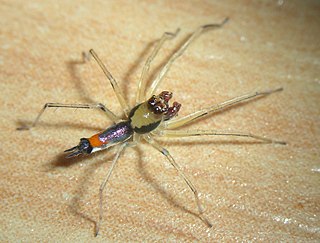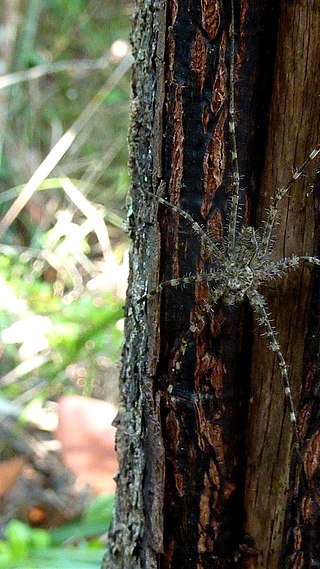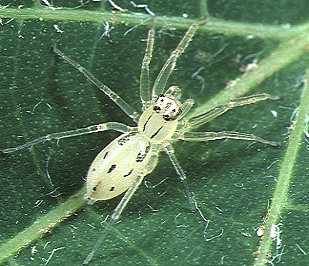
The Thomisidae are a family of spiders, including about 170 genera and over 2,100 species. The common name crab spider is often linked to species in this family, but is also applied loosely to many other families of spiders. Many members of this family are also known as flower spiders or flower crab spiders.

Theridiidae, also known as the tangle-web spiders, cobweb spiders and comb-footed spiders, is a large family of araneomorph spiders first described by Carl Jakob Sundevall in 1833. This diverse, globally distributed family includes over 3,000 species in 124 genera, and is the most common arthropod found in human dwellings throughout the world.

Asemonea is a genus of jumping spiders that was first described by Octavius Pickard-Cambridge in 1869.

Trechaleidae (tre-kah-LEE-ih-dee) is a family of araneomorph spiders first described by Eugène Simon in 1890. It includes about 140 described species in 16 genera. They all live in Central and South America except for Shinobius orientalis, which is endemic to Japan. Other names for the family are longlegged water spiders and fishing spiders. The family Trechaleidae is closely related to Pisauridae and Lycosidae, and the three families are sometimes referred to as the lycosid group.

Dolichognatha is a genus of tropical and subtropical long-jawed orb-weavers that was first described by Octavius Pickard-Cambridge in 1869. Originally placed with the Archaeidae, it was transferred to the Araneidae in 1967, and to the Tetragnathidae in 1981.

Ariamnes is a genus of comb-footed spiders that was first described by Tamerlan Thorell in 1869. Some species have greatly elongated abdomens, making them resemble a twig.

Agyneta is a genus of dwarf spiders that was first described by J. E. Hull in 1911.

Asemonea virgea is a species of jumping spider in the genus Asemonea that is endemic to the Republic of the Congo. The spider was first described in 2003 by Wanda Wesołowska and Tamás Szűts. The spider is small, with a dark yellow carapace typically 1.6 mm (0.063 in) long and an abdomen 1.8 mm (0.071 in) long. The male has a distinctive set of spines on its palpal tibia, after which it is named. It is similar to the related Asemonea cristata but differs in its species range, as the other spider is found in Burma, and its shorter femoral apophysis. The female has not been described.

Asemonea flava is a species of jumping spider in the genus Asemonea that is endemic to Kenya. The spider was first defined in 2001 by Wanda Wesołowska, one of over 500 that the arachnologist described during her career. The spider is small, with a yellow carapace and abdomen each typically 2.2 mm (0.087 in) long, although the abdomen is narrower and lighter. The female has spines on its palpal tibia and a distinctive epigyne that with a complex internal structure with helical receptacles. The male has not been described.

Asemonea cuprea is a species of jumping spider in the genus Asemonea that is found in South Africa and Zambia. The spider was first defined in 2009 by Wanda Wesołowska, one of over 500 that the arachnologist described during her career. It is small, generally yellow and lives on the leaves of short shrubs. It has an pear-shaped carapace and a narrower abdomen that each have a length between 1.5 and 1.7 mm. The male has a distinctive coloration with bright orange scales covering the clypeus and eye field and vivid orange hairs on the back half of the abdomen, which are recalled by the species name. The male also has an unusual right-angle shaped subtegulum and the female a simpler epigyne than other Asemonea species that helps identify the species.

Asemonea serrata is a species of jumping spider in the genus Asemonea that is endemic to Kenya. The spider was first defined in 2001 by Wanda Wesołowska, one of over 500 that the arachnologist described during her career. The spider is small, with a yellow-orange carapace typically 2.5 mm (0.098 in) long and yellow abdomen typically 2.5 mm (0.098 in) long. The abdomen has a black arrow-shape on it. The male is distinguished from other Asemonea species by the serrated edge on its the long and thin femoral apophysis. This is also recalled in the species name. The female has not been described.

Asemonea pallida is a species of jumping spider in the genus Asemonea that is endemic to Kenya. The spider was first defined in 2001 by Wanda Wesołowska, one of over 500 that the arachnologist described during her career. The spider is small, and light, nearly white, as is reflected in the species name. It has an elongated carapace that is between 1.9 and 2.2 mm long and a broader abdomen that has a length between 3.0 and 3.1 mm. The female has a distinctive epigyne with two depressions joined by an elevated bridge. The male has not been described.

Asemonea clara is a species of jumping spider in the genus Asemonea that is endemic to South Africa. The spider was first defined in 2013 by Wanda Wesołowska and Charles Haddad. The spider is small, with a cephalothorax that is between 1.9 and 2.2 mm long and an abdomen that is between 2.2 and 2.4 mm long. The white carapace is pear-shaped and the abdomen is white apart from two dark lines across the front, a small round dot in the middle and a black dot towards the back. The male has not been described.

Lyssomanes viridis, commonly known as the magnolia green jumper, is a species of jumping spider of the genus Lyssomanes, for which it is the type species. The species' native range extends through much of North America and Central America.

Asemonea tanikawai is a species of jumping spider in the genus Asemonea that is endemic to Japan. It lives in trees in mountain ranges. The spider was first described in 1996 by Hiroyoshi Ikeda. The spider is small, with a carapace [prosoma that between 1.31 and 1.60 mm long and an abdomen is between 1.84 and 2.24 mm long. It is whitish-yellow with a pattern of two brown stripes down the back of the carapace and nine black dots on the back of the abdomen. The male has a distinctive pedipalp with a complex tibial apophysis and a furrow alongside the femoral apophysis, which distinguishes it from the otherwise similar Asemonea maculata and Asemonea pinangensis. The female is also similar, with its copulatory openings hidden in its epigyne. The spider has been found throughout Okinawa and the other Ryukyu Islands.

Asemonea pinangensis is a species of jumping spider in the genus Asemonea that is endemic to Malaysia. The spider was first defined in 1980 by Fred Wanless. It is a small spider, with a carapace that is typically 1.16 mm (0.046 in) long and an abdomen typically 1.2 mm (0.047 in) long. The carapace is whitish-yellow with black markings and the abdomen black with whitish-yellow markings. The coloration, as well as the lip on its dorsal tibial apophysis, help distinguish the species from the otherwise similar Asemonea maculata, Asemonea minuta and Asemonea tanikawai. The female has not been described.

Asemonea maculata is a species of jumping spider in the genus Asemonea that is endemic to Ivory Coast. The spider was first defined in 1980 by Fred Wanless. It is a small spider, with a carapace that is between 2.08 and 2.10 mm long and an abdomen typically 2.4 mm long. The carapace is amber to whitish-yellow and the abdomen whitish-yellow, both with black markings. It is similar to the related species Asemonea pinangensis and Asemonea tanikawai, but can be distinguished by the tibia on the male pedipalp. The female has not been described.

Asemoneinae is a subfamily of jumping spiders. It was created in 2015 by Wayne Maddison. Most species are found in Africa or Asia. The subfamily initially had five genera, but Hindumanes was later transferred to the subfamily Lyssomaninae.

Asemonea murphyae is a species of jumping spider in the genus Asemonea that lives in Kenya and South Africa. First defined in 1980 by Fred Wanless, the spider is named after the British arachnologist Frances M. Murphy. Asemonea murphyae thrives in a wide range of environments, particularly by the side of rivers, streams and tracks. A small spider, with a carapace that is between 1.48 and 2.00 mm long and an abdomen between 2.4 mm long, it is generally yellow with a green tint that enables it to blend into its environment. The female is smaller than the male. The species can be distinguished from other spiders in the same genus by the design of the female's epigyne and the male pedipalp, particularly the male's forked spike on the palpal tibia.

Asemonea stella is a species of jumping spider in the genus Asemonea that lives in Kenya, South Africa and Tanzania, and has been introduced to Australia. It thrives in a wide range of environments, from open farmland to semi-aquatic vegetation. The spider was first defined in 1980 by Fred Wanless. The spider is small, between 3.1 and 3.64 mm long, the female being generally larger than the male. It has a carapace that is pear-shaped and either yellow in the case of the male or green in the case of the female, measuring between 1.28 and 1.46 mm in length.The abdomen is whiter, between 1.28 and 1.46 mm long and has a distinctive star-shaped pattern on the back. Its copulatory organs help differentiate the species, particularly the furrow on the femoral apophysis of the male palpal bulb and the shallow depression in the middle of the female epigyne.














